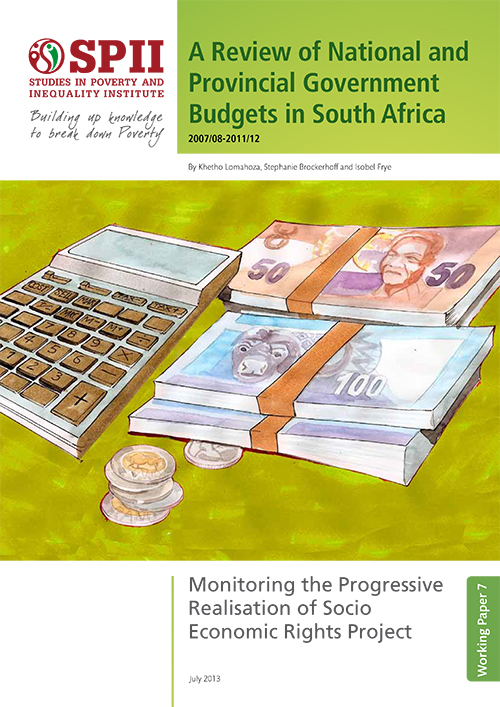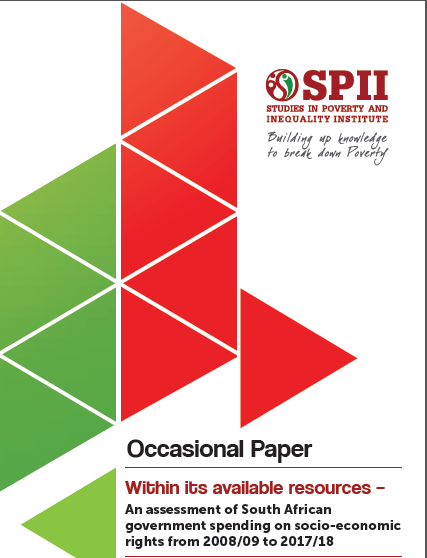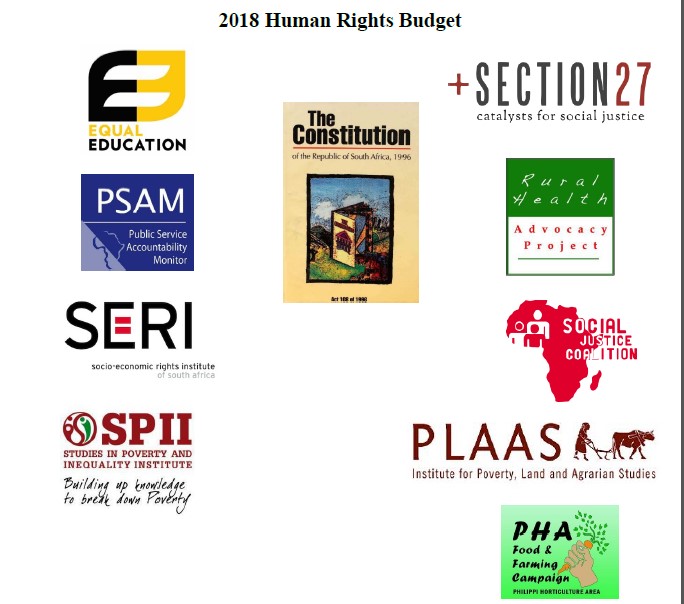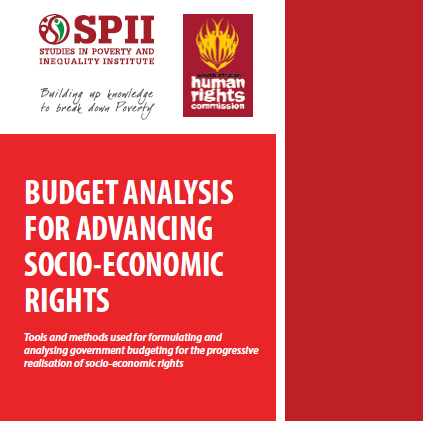SER Budget Analysis
Socio-Economic Rights in a Time of Austerity
Socio-Economic Rights in a Time of Austerity: A Panel Debate in Recognition of the Monitoring of Progressive Realisation of Socio-Economic Rights Project.
Section 10 of the South African Constitution guarantees to all inherent dignity and the right to have their dignity respected and protected.
Sections 26 and 27 of the Constitution guarantee to all the right of access to adequate housing, health care services, sufficient food and water, and to social security. These socio-economic rights are contained in the Bill of Rights of the Constitution. They are the means by which the inherent rights to equality, dignity are to be achieved, and the transformational aims of the Constitution, realised. Section 7 (2) of the Constitution clearly places on the state the obligation to ‘respect, protect, promote and fulfil the rights in the Bill of Rights’.
International Covenant on Economic Social and Cultural Rights (ICESCR)
Letter from the Chairperson of the Committee on Economic, Social and Cultural Rights to States parties to the International Covenant on Economic, Social and Cultural Rights
I write to you, on behalf of the Committee on Economic, Social and Cultural Rights (the Committee), as representatives of States parties to the International Covenant on Economic, Social and Cultural Rights (the Covenant) and in relation to the protection of the Covenant rights in the context of the economic and financial crisis.
The Committee has observed over recent years the pressure on many States parties to embark on austerity programmes, sometimes severe, in the face of rising public deficits and poor economic growth. Decisions to adopt austerity measures are always difficult and complex, and the Committee is acutely aware that this may lead many States to take decisions with painful effects, especially when these austerity measures are taken in a recession.
Concluding observations on the initial report of South Africa - Committee on Economic, Social and Cultural Rights
1. The Committee on Economic, Social and Cultural Rights considered the initial report of South Africa on the implementation of the International Covenant on Economic, Social and Cultural Rights (E/C.12/ZAF/1) at its 42nd, 43rd and 44th meetings (E/C.12/2018/SR.42, 43 and 44) held on 2nd and 3rd October 2018. It adopted the following concluding observations at its 58th meeting, held on 12 October 2018.
Introduction
2. The Committee welcomes the timely initial report submitted by the State party and the supplementary information provided in the replies to the list of issues (E/C.12/ZAF/Q/1/Add.1). The Committee also appreciates the constructive dialogue held with the State party’s high-level inter-ministerial delegation. It notes with appreciation the active role played by the South African Human Rights Commission and by civil society both in consultations for the preparation of the report and in the review process of the State party’s report.
Occasional Paper 2017/18
The inclusion of socio-economic rights in South Africa’s first democratic Constitution envisioned the reconstruction and transformation of a divided and deeply unequal society. These socio-economic rights to education, social security, health care, housing, food, water and sanitation, a healthy environment, and land are, crucially, redress for past racial discrimination.
However, unsustainable levels of poverty and inequality, compounded by widespread unemployment and inadequate access to basic services for many poor communities, continue to violate people’s rights, resulting in persistent social and economic unrest. The development of economic policies that appear to advance the interests of the economic elite, has led to growing inequality, at the expense of basic needs to which vulnerable and marginalised communities are entitled as per the Constitution.
This Occasional Paper provides a consistent framework for socio-economic rights budget analysis. The South African government has in the past acknowledged that state budgets include human rights processes, which require the government to allocate funds in compliance with State obligations toward the full realisation of human rights, and that these obligations should guide the priorities underlying economic and administrative decisions reflected in the national budget. However, despite growing revenue and sustained GDP growth for much of the post-apartheid period, poverty has persisted in South Africa and income inequality has actually increased. As a result, 23 years after the dawn of democracy, the majority of South Africans continue to experience daily socio-economic rights violations. It has become increasingly apparent that for human rights researchers and advocates to hold the government accountable for these violations, budget analysis is required to establish whether or not human rights are indeed a priority for the government.
Press Statement: CIVIL SOCIETY PROPOSES ALTERNATIVE, PEOPLE-CENTERED BUDGET
20 FEBRUARY 2018
PRESS RELEASE
CIVIL SOCIETY PROPOSES ALTERNATIVE, PEOPLE-CENTERED BUDGET
Broad collective of socio-economic rights organisations offer example of a budget which takes ordinary South Africans seriously.
Minister Gigaba will be asked to make hard, but essential budget choices in his first budget speech in Parliament tomorrow.
But the Minister’s task will be to allocate funds in such a way as to ensure that South Africa's chronic poverty and inequality are alleviated, and that effect is given to the rights of the most vulnerable.
A broad cross-section of South African civil society has collaborated to draft an alternative ‘Human Rights Budget’, which sets out what a budget that takes the rights of ordinary people seriously would look like.
Alternative Budget Speech 2018
The preamble of the Constitution of South Africa commits us amongst others to “Improve the quality of life of all citizens and free the potential of each person.” In including this, there is an implicit understanding that the central goal of government is to use the levers available to them to advance this cause. The national budget is an opportunity to articulate this goal into a programme of action that uses the redistributive power of government spending to enable that. Unfortunately, when we consider the lives of ordinary South Africans the evidence suggests that while we have made some progress the vast majority of our people continue to be trapped in a vicious cycle of underdevelopment driven by widening inequality.
South Africa currently faces massive economic and social pressures. One out of every two South Africans is currently living in poverty. The rate of unemployment in the country continues to grow - 64% more people are in long-term unemployment today than in 2008. The state is accruing debt faster than it is collecting revenue. And the bail-outs required by financially unsustainable state-owned enterprises are placing extreme pressure on the fiscus.
SPII, SAHRC Guide to Budget Analysis for Socio Economic Rights 2016
The South African Constitution (Constitution) guarantees the progressive realisation of socioeconomic rights (SER) – including the rights to housing, education, health care, water and sanitation, social security, environment and food – within the State’s available resources. Already in 1995, one year before the adoption of the final Constitution, the South African government signed the International Covenant on Economic, Social and Cultural Rights of 1966 (ICESCR). This signalled a recognition by the first democratic government that all human rights are equal and inalienable, and that importantly “the ideal of free human beings enjoying freedom from fear and want can only be achieved if conditions are created whereby everyone may enjoy [his or her] economic, social and cultural rights, as well as [his or her] civil and political rights”. Twenty years later South Africa ratified the ICESCR, providing further impetus to the Constitutional obligation to progressively realise socio-economic rights to the maximum of its available resources. The ICESCR imposes an obligation on governments to move as expeditiously and effectively as possible towards that goal. However, despite these provisions, claims are frequently made by government that it does not have the resources to meet its domestic and international SER legal obligations. Understanding how State budgets operate and how the government prioritises the budget to meet its constitutional SER obligations has become necessary for human rights advocates to rebut these claims.
Socio-Economic Rights: Budget Analysis
The effectiveness of the state’s ability to address the very high levels of poverty and inequality in South Africa is intrinsically, but not only, dependant on the resources that it makes available to realise the socio-economic rights contained in the Constitution of South Africa. Tracking state allocation of funding, as well as the maximum utilisation of the allocated funds by state departments forms a critical part of oversight of state performance. As part of an on-going project to establish indicators for monitoring the progressive realisation of socio-economic rights over time, which SPII is undertaking in collaboration with the South African Human Rights Commission, this report serves to establish a baseline for SER expenditure.
Monitoring the progressive realisation of socio-economic rights raises conceptual challenges that are broader than, for instance, the monitoring of rights’ violations. It requires clear indicators and thresholds for people to assess whether, over time, the resources are being made available in sufficient transfers, to move towards the universal enjoyment of rights as directed by the Constitution.
As South Africa proceeds to ratify the International Covenant on Economic, Social and Cultural Rights (ICESCR), the ability of both the state and oversight bodies to monitor its performance in this regard is critical.
In 2013, SPII set out to do just that, in: Working Paper 7: A Review of National and Provincial Budgets in South Africa: 2007/08 – 2011/12
SPII has been busy refining our methodology for SER budget analysis in South Africa with the support of the International Budget Partnership. This will be reflected in our updated review of national and provincial budgets set for release in September 2015.















